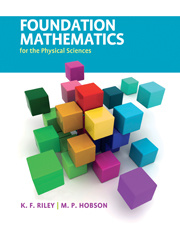Foundation Mathematics for the Physical Sciences
Langue : Anglais
Auteurs : Riley K. F., Hobson M. P.

This tutorial-style textbook develops the basic mathematical tools needed by undergraduates to solve problems in the physical sciences.
This tutorial-style textbook develops the basic mathematical tools needed by first and second year undergraduates to solve problems in the physical sciences. Students gain hands-on experience through hundreds of worked examples, self-test questions and homework problems. Each chapter includes a summary of the main results, definitions and formulae. Over 270 worked examples show how to put the tools into practice. Around 170 self-test questions in the footnotes and 300 end-of-section exercises give students an instant check of their understanding. More than 450 end-of-chapter problems allow students to put what they have just learned into practice. Hints and outline answers to the odd-numbered problems are given at the end of each chapter. Complete solutions to these problems can be found in the accompanying Student Solutions Manual. Fully-worked solutions to all problems, password-protected for instructors, are available at www.cambridge.org/foundation.
1. Arithmetic and geometry; 2. Preliminary algebra; 3. Differential calculus; 4. Integral calculus; 5. Complex numbers and hyperbolic functions; 6. Series and limits; 7. Partial differentiation; 8. Multiple integrals; 9. Vector algebra; 10. Matrices and vector spaces; 11. Vector calculus; 12. Line, surface and volume integrals; 13. Laplace transforms; 14. Ordinary differential equations; 15. Elementary probability; Appendices; Index.
K. F. Riley read mathematics at the University of Cambridge and proceeded to a Ph.D. there in theoretical and experimental nuclear physics. He became a Research Associate in elementary particle physics at Brookhaven, and then, having taken up a lectureship at the Cavendish Laboratory, Cambridge, continued this research at the Rutherford Laboratory and Stanford; in particular he was involved in the experimental discovery of a number of the early baryonic resonances. As well as having been Senior Tutor at Clare College, where he has taught physics and mathematics for over 40 years, he has served on many committees concerned with the teaching and examining of these subjects at all levels of tertiary and undergraduate education. He is also one of the authors of 200 Puzzling Physics Problems.
M. P. Hobson read natural sciences at the University of Cambridge, specialising in theoretical physics, and remained at the Cavendish Laboratory to complete a Ph.D. in the physics of star-formation. As a Research Fellow at Trinity Hall, Cambridge, and subsequently an Advanced Fellow of the Particle Physics and Astronomy Research Council, he developed an interest in cosmology, and in particular in the study of fluctuations in the cosmic microwave background. He was involved in the first detection of these fluctuations using a ground-based interferometer. Currently a University Reader at the Cavendish Laboratory, his research interests include both theoretical and observational aspects of cosmology, and he is the principal author of General Relativity: An Introduction for Physicists. He is also a Director of Studies in Natural Sciences at Trinity Hall and enjoys an active role in the teaching of undergraduate physics and mathematics.
M. P. Hobson read natural sciences at the University of Cambridge, specialising in theoretical physics, and remained at the Cavendish Laboratory to complete a Ph.D. in the physics of star-formation. As a Research Fellow at Trinity Hall, Cambridge, and subsequently an Advanced Fellow of the Particle Physics and Astronomy Research Council, he developed an interest in cosmology, and in particular in the study of fluctuations in the cosmic microwave background. He was involved in the first detection of these fluctuations using a ground-based interferometer. Currently a University Reader at the Cavendish Laboratory, his research interests include both theoretical and observational aspects of cosmology, and he is the principal author of General Relativity: An Introduction for Physicists. He is also a Director of Studies in Natural Sciences at Trinity Hall and enjoys an active role in the teaching of undergraduate physics and mathematics.
Date de parution : 03-2011
Ouvrage de 736 p.
19.5x25.4 cm
Thème de Foundation Mathematics for the Physical Sciences :
© 2024 LAVOISIER S.A.S.



